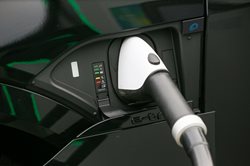Middlesex County and Somerset County had the largest growth in electric vehicle (EV) registrations so far this year, leading a trend of growing EV adoption across the NJTPA region and beyond.
.JPG.aspx?width=500&height=333)
That was among the insights offered by Zenon Tech-Czarny, Principal Planner, Environmental Planning at NJTPA, in a presentation at a joint meeting of the Project Prioritization and Planning and Economic Development committees on October 16. He highlighted EV data from state and other sources compiled on the NJTPA’s
EV Resources hub site.
As of June 2023, there were 128,374 Plug-in Electric Vehicles (PEVs) in New Jersey and almost 100,000 within the NJTPA’s 13-county region, according to the state Department of Environmental Protection’s (NJDEP)
Alternative Fuel Vehicle (AFV) Report. This excludes Hybrid Electric Vehicles, which are charged with an onboard internal combustion engine.
The number of PEVs jumped 36 percent in the most recent 6-month interval, the largest increase of similar periods dating back to 2018. "That's good news in terms of EV adoption in the region and state," Tech-Czarny said.
InsideEVs.com reported that EVs made up about
13 percent of new car sales in New Jersey in the first half of 2023. For the North Jersey region, that brings PEVs to about 2 percent of its total vehicles. “The numbers are rapidly increasing but there are many more EVs needed" to reach the state’s goal of 330,000 light-duty PEVs by 2025, he said.
Bergen County and Middlesex County, the most populous counties in North Jersey, have the most EVs in the region, 17,779 and 15,392 respectively. Somerset County (3.09 percent) has the highest percentage of EVs, ahead of Bergen (2.52 percent) and Middlesex (2.47 percent).
Middlesex County and Somerset County had the highest increase since December, growing by 0.82 percent and 0.81 percent, respectively. Within Middlesex County, Carteret, Edison and Woodbridge had very large increases, driving the growth in Middlesex County, according to Tech-Czarny.

A spreadsheet with data about EVs by Municipalities can be found on the
Data page of the
EV Resources hub site. These numbers are estimates based on NJDEP AFV report and the US Census data. The data shows the estimated number of total vehicles, number of EVs, the percent EVs, percent change between December 2022 and June 2023, and the “EV Index” a combination of the number and percent. A correction to the data was made since the presentation.
The
EV Resources hub site also includes an interactive map of charging stations in the region and Alternative Fuel Vehicles (AFV) corridors. AFV Corridors are highways designated by the federal government to have EV charging stations no more than every 50 miles. A station must be within one mile of an exit. "That’s going to be an important part of the state’s NEVI [
National Electric Vehicle Infrastructure] plan to install fast-charging stations on these EV corridors,” Tech-Czarny said.
Currently, there are 856 networked EV charging stations in the NJTPA region. There are 13 existing community DC fast chargers, 8 existing corridor DC fast chargers, and 18 DC fast chargers planned.
Above photos by Ed Murray